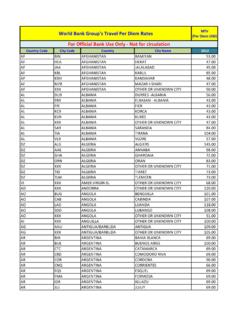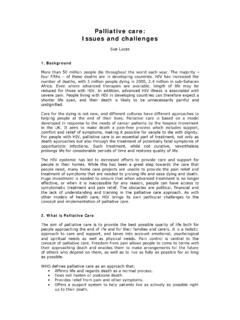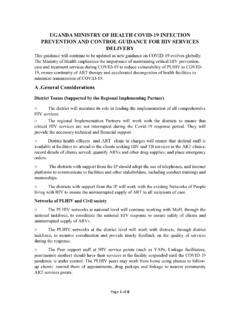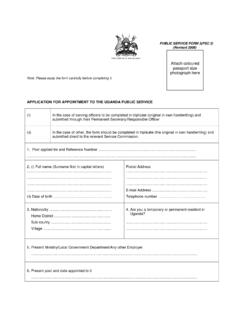Transcription of GUIDELINES FOR ESTABLISHING, LICENSING, REGISTERING …
1 1 ministry of ministry OF education AND SPORTS GUIDELINES FOR ESTABLISHING, LICENSING, REGISTERING AND CLASSIFICATION OF PRIVATE SCHOOLS/INSTITUTIONS IN uganda (BY PRIVATE SCHOOLS AND INSTITUTIONS DEPARTMENT) 2 Table of Contents A. PREAMBLE ..4 B. PURPOSE/RATIONALE OF THE GUIDELINES ..4 C. SCOPE OF THE GUIDELINES ..4 D. PRIVATE SCHOOLS/INSTITUTIONS AS PARTNERS IN NATIONAL DEVELOPMENT ..5 E. THE ROLE OF ministry OF education AND SPORTS IN LICENSING AND REGISTRATION OF PRIVATE/INSTITUTIONS ..5 F. GENERAL REQUIREMENTS FOR ESTABLISHING A PRIVATE SCHOOL/INSTITUTION ..6 G. THE PROCEDURE FOR APPLYING FOR LICENSING OF A PRIVATE SCHOOL/INSTITUTION ..7 H. THE PROCEDURE FOR APPLYING FOR REGISTRATION OF A PRIVATE SCHOOL/INSTITUTION 8 I. REQUIREMENTS FOR OPERATING PRE-PRIMARY (NURSERY) SCHOOLS ..9 J. REQUIREMENTS FOR OPERATING PRIVATE PRIMARY SCHOOLS.
2 9 K. REQUIREMENTS FOR OPERATING PRIVATE SECONDARY SCHOOLS ..10 L. REQUIREMENTS FOR OPERATING BUSINESS, TECHNICAL, VOCATIONAL education AND TRAINING (BTVET) INSTITUTIONS ..11 M. THE DOCUMENTS THAT MUST BE ATTACHED TO THE APPLICATION FORMS FOR LICENSING/REGISTRATION OF A PRIVATE SCHOOL/INSTITUTION ..11 N. INTERNATIONAL SCHOOL/ INSTITUTION ..13 O. IMPORTANCE OF THE INFORMATION ON THE PRIVATE SCHOOLS/INSTITUTIONS TO THE ministry OF education AND P. SPECIAL PROVISIONS RELATING TO PRIVATE SCHOOLS/INSTITUTIONS education ( PRE- PRIMARY , PRIMARY AND POST- PRIMARY) ACT 2008 SECTIONS 31 TO 4519 Q. ACTIONS BY THE MINISTER ..20 R. ACTIONS BY OTHER OFFICIALS OF THE ministry OF education AND SPORTS ..20 S. ACTIONS CALLING FOR DISCIPLINARY MEASURES ..21 T. DEFINITION OF TERMS/FURTHER ADVICE TO INTENDING PROPREITORS ..21 W. ANNEXES ..26 APPLICATION FOR LICENCE TO OPERATE A NEW PRIVATE PRIMARY (UNDER SECTION 32/33 OF THE education ( PRE- PRIMARY , PRIMARY AND POST- PRIMARY) ACT 2008.)
3 26 APPLICATION FOR REGISTRATION AND CLASSIFICATION OF A PROVISIONALLY LICENSED PRIVATE PRIMARY SCHOOL/INSTITUTION .. 32 3 LIST OF ACRONYMS Board of Governors Requirements and Minimum Standards Administrative Officer CMU ..Construction Management Unit ECD ..Early Childhood Development D/DES .. Director, Directorate of education Standards DES ..Directorate of education Standards DEO ..District education Officer DHI ..District Health Inspector DIS ..District Inspector of Schools MEO ..Municipal education Officer MIS ..Municipal Inspector of Schools MoES .. ministry of education and Sports National Curriculum Development Centre NDP ..National Development Plan NGO ..Non-Governmental Organization PS/ES ..Permanent Secretary, ministry of education and Sports School Management Committee Clerk UNEB .. uganda National Examinations Board 4 A.
4 PREAMBLE The government of uganda has embraced liberalization policies in all its sectors including the education and sports sector. Since the early 1990s, there has been phenomenal growth in private schools, at secondary, primary and tertiary institution levels. The Government of uganda recognises the important role being played by the Private Sector in providing education to citizens of this country. On its own the government could not be able to meet the challenge of providing education to the large and increasing number of school-going age children. The private sector is diverse and comprised of wealthy individuals and investors, communities, civil society organizations, Local and International NGOs, and faith-based organizations; many of whom have already shown interest in providing education services to the public.
5 The Private sector is therefore encouraged to play its role effectively and efficiently to supplement government s efforts of availing education to all. However, the provision of education by this sector must be guided and steered in accordance with Government regulations and standards. It must be in line with national aims and objectives of education as stipulated in the Government White Paper on education of 1992, National Development Plan (NDP), the Local Governments Act, the Finance Act, and the education ( Pre- Primary , Primary and Post- Primary) Act 2008. The education ( Pre- Primary , Primary and Post- Primary) Act 2008 mandates the education Sector to provide a framework for the delivery of a high level quality and affordable education service, and GUIDELINES for professional and ethical conduct of personnel in schools/institutions.
6 The purpose of the GUIDELINES is to provide more information to the key stakeholders and to operationalize the existing laws, regulations and policies as follows:- 1. Providing procedures, requirements, standards, classification and regulation for establishing and running private schools/institutions. 2. To highlight various laws/Acts on education and the powers vested in the responsible person(s) for action in the process of licensing and registration of private schools. 3. To foster private sector participation in supplementing the government efforts to efficiently and effectively provide education services to all. 4. To divulge the likely actions that may call for disciplinary measures in regard to delivery of education services by private providers. C. SCOPE OF THE GUIDELINES These GUIDELINES offer to cover the contextual areas of providing education service by private schools/institutions within the borders of uganda .
7 These are GUIDELINES for establishing, licensing, REGISTERING and classification of private schools/institutions. B. PURPOSE/RATIONALE OF THE GUIDELINES 5 D. PRIVATE SCHOOLS/INSTITUTIONS AS PARTNERS IN NATIONAL DEVELOPMENT The Government recognizes the contributions made by the private sector to education and thus considers the private sector as a key partner in the provision of education service. For instance; 1. Both private and Government aided schools/institutions are governed by the education ( Pre- Primary , Primary and Post- Primary) Act 2008; Therefore, they must operate according to the Rules and Regulations set by this Act. 2. Private and Government aided schools/institutions follow the same syllabi prepared by the ministry of education and Sports (National Curriculum Development Centre - NCDC) and are evaluated by the same examination bodies, such as the uganda National Examinations Board (UNEB).
8 3. The 1992 Government White Paper on education is the basis of official policy on the purpose and programmes of education . It is the supreme guidance for the sector. It aims at providing relevant education and enhancing efficiency and strengthening partnerships in education sector. The education ( Pre- Primary , Primary and Post- Primary) Act 2008 is drawn from the recommendations of the 1992 Government White Paper on education . 4. On completion, the products of both Private and Government aided schools/institutions enter the same labour market or proceed to either Private or Government Universities whose products are absorbed by the same labour market within and outside uganda . E. THE ROLE OF ministry OF education AND SPORTS IN LICENSING AND REGISTRATION OF PRIVATE/INSTITUTIONS The broad sector objectives are expansion of access to equitable and quality education at all levels as well as enhancement of efficiency and effectiveness in service delivery.
9 To enable private schools/institutions to operate legally, the sector plays the following roles: 1. Training all teachers using the same syllabi to teach either in Private or Government aided schools/institutions for national standardisation. This is the stock from which private schools select, employ and present to MoES at the time of licensing/registration of the schools. 2. Providing policy GUIDELINES , which affect both Private and Government aided schools/Institutions. 3. Organizing improvement seminars/workshops and in-service courses, which bring together staff from both Private and Government aided schools/institutions. 4. Issuing minimum requirements and minimum standard indicators that are used by both partners as a measure for delivery of quality educational services. 5. Carrying out school inspections by the Directorate of education Standards (DES) and the District/Municipal Inspectorates so as to ensure that minimum standards 6 are kept and also to provide support supervision in both Private and Government aided schools/institutions.
10 6. Providing professional support to the teachers, Headteachers, learners and the parents in both Private and Government aided schools/institutions under the provisions of the Constitution of the Republic of uganda , 1995. 7. Setting, marking and issuing licenses and registration certificates to private schools for public examinations (by examination bodies). 8. Keep a register of all schools in the country, both government and private. 9. REGISTERING of teachers. ROLE OF THE PROPRIETOR 1. The proprietor sets up the school/institution and is therefore the vision bearer. 2. He/she advises the BOG/SMC to ensure that the vision of the school is kept alive. 3. Ensures infrastructural and capacity development of the school (growth of the school) 4. Ensures that the school has an approved BoG/Management committee 5. Works with the BOG/SMC to ensure smooth school/institution running NOTE: The proprietor starts, but MUST NOT head the school/institution.




